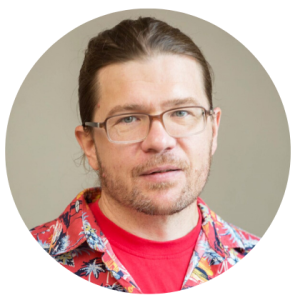Meet the Trainer – Pavel Baranov

Meet Pavel Baranov, Professor of Biomolecular Informatics at the University College Cork, Ireland. Pavel’s research group focuses on the understanding of how proteins are synthesised and how their synthesis is regulated.
Why did you choose to become a scientist?
When I was a toddler, I wanted to be a firefighter. Within a couple of years, I decided that being an astronaut would be more fun. A few more years passed, and I began to dream of becoming a scientist. I guess at that point I stopped growing and started living my dream.
What is your research focus?
My research group studies RNA translation. Translation is at the core of biology. Cells spend most of their energy on protein synthesis and the ribosome is the most abundant molecular machine in almost all cells. Ribosomal RNAs and tRNAs are the most conserved molecules across all kingdoms of life, and it is now apparent that proteins evolved earlier than DNA. Life as we know it relies on two main type of molecules not found outside of living systems – nucleic acids and proteins. It is the process of translation that connects these two chemistries together. I could hardly think of a more fundamental, interesting and challenging cellular process than translation.
Where do you see this field heading in the future?
As translation brings two chemistries together it is far more complex than other molecular process such as transcription and replication. Because of its complexity and the lack of tools to study it, studying translation is very challenging. The tools are now being developed, e.g. variations of ribosome profiling techniques, real-time single molecule imaging, cryo-EM microscopy, etc. The main change that I foresee is that translation will draw the attention of many more biomedical researchers, for better or worse.
What is your number one tip for people looking for scientific training?
Independent practice is the key in my opinion. After taking a course you may get the impression that you can do something, but it could be a false impression – you don’t really know if you can unless you have done it.
If you weren’t a scientist, what would you be?
Science is not a job for me, it is a dream. If I were not able to make my living as a researcher, I would have to find something else to make earnings, but I would not give up on my scientific interests.
You are organising the EMBO Practical Course ”Measuring Translational Dynamics by Ribosome Profiling” (3 – 9 May 2020). What is the greatest benefit of the course for the scientific community and what could the techniques in this course be used for in the bigger picture?
The invention of ribosome profiling is the most significant development in the field of protein synthesis since the deciphering of the ribosome 3D structure. Ribosomal profiling is a popular technique for measuring the rate of translation in addition to measuring RNA levels, but this was somewhat possible even before. The unique ability of ribosome profiling is the detection of which open reading frames are being translated in RNA. The application of ribosome profiling revealed that even in eukaryotes the same mRNA molecule is often used for making more than one polypeptide, and that our current knowledge of the human genome protein coding repertoire is still far from complete. In addition to detecting translated frames, ribosome profiling could be used to detect ribosome pauses. We recently learned that such pauses could be used to regulate gene expression and other biological processes. This course will provide trainees with everything what is needed for mastering this powerful technology, from hands-on experience in generating ribosome profiling data to bioinformatics analysis and the use of public data resources.
Interested in this course? Submit your application by 9 February!